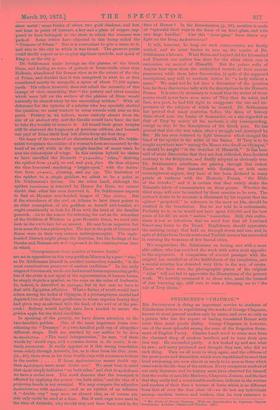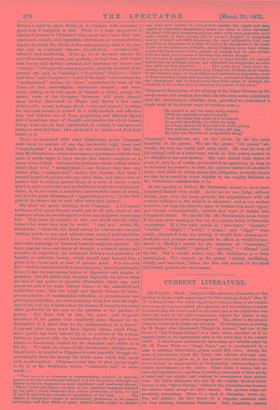S WINE URNE'S " CHAPMAN."*
MR. Swns-nunble is doing an important service to students of Elizabethan letters in republishing the works of George Chapman, known to most general readers only by name, and even so only as a person who has the repute of having translated Homer with more than usual poetic ability. George Chapman is, however, one of the most splendid among the suns of the forgotten firma- ment of English Poetry. Charles Lamb tried to rouse men from the charmed sleep of modern intellect, and to turn their eyes that way. He succeeded partly. A few looked up and saw what he saw ; and many professed and thought they saw, who did no such thing. Then we all went to sleep again, and the editions of The great poets and dramatists, which were republished to meet that brief awakening, are now almost as rarely to be seen as those which came out in the life-time of the authors. Every competent student of our early literature and its history must have observed for himself that the works of men like Marlowe, Chapman, Jenson, and the fact that they really had a considerable audience, indicate in the writers and readers of their time a texture of brain which is so different from that of even the best class of—we do not say individuals among—modern writers and readers, that its very existence is * 77id Works of George Chapman. With an Introduction by Algernon Charles Bwinburne. London: Chatto and Windus. 1875.
become a mystery, upon which, as is common with mysteries, a great deal of suspicion is cast. What, to a large proportion of educated persons in Chapman's time, must have been clear, true, passionate, simple, and impressive statements or representations, appear, to nearly the whole of the corresponding class in the pre- sent day, as hopelessly obscure, hyperbolical, "metaphysical," affected, and unaffecting. If we go on at the same rate for the next three hundred years, our posterity, in that time, with brains and hearts still further softened and hardened by luxury and "science," will reject the simplest poetry, properly so called, of the present era, such as Coleridge's "Genevieve," Goethe's "Alexis and Dora," and Tennyson's "Lord of Burleigh " with smiles at the " metaphysical " notions of " Love " entertained by most of the Poets of that unintelligible nineteenth century ; and some critic, mining, as he will speak of himself as doing, among the quartz rocks of the Georgian literature, will pride himself upon having discovered in Moore and Byron a few veins of real gold ; verses, perhaps, about "wine and women," in which the universal passion is treated in a really modern and effective way, and without any of those perplexing and affected flights into a breathless ether of thought and emotion for which human beings were not, in fact, constituted, if, indeed, it had any real existence even for those who pretended to inhale and find their health in it.
Even, as compared with other Fli7obethan poets, Chapman must seem to readers of our day intolerably high, tense, and "metaphysical," a word which we are astonished to find that even Mr. Swinburne—whose uncommon acquaintance with the true value of words ought to have taught him better—employs as a vague term of abuse. Incompetent critics are always calling writers above_ their level "metaphysical,"—not because they have any notion what " metaphysical " means, but because they have a natural hatred of persons who are above them, and have a sort of instinct that to employ against them, as a term of abuse, a term which is quite irrelevant, and probably not really one implying any defect, is, at all events, a somewhat unanswerable mode of attack, and has the great advantage of "aggravating you so," as the little girls in the streets say to each other when they quarrel.
We shall not quote anything from Chapman. A few sparks or fumes of his great furnace would not at all help those of our readers to whom he would appeal to form any judgment concerning him. They must be content to take our words and Mr. Swin- burne's for what they may be worth. "And yet," writes Mr.
Swinburne, "there are not many among his various and unequal writings which we can open without some sense of great qualities.
There are few poets from whose remains a more copious and noble anthology of detached beauties might be selected. He has a singular force and depth of thought, a constant energy and intensity of expression, an occasional delicacy and perfection of fanciful or reflective beauty, which should have insured him a place in the front rank at least of gnomic poets. It is true that his "wisdom entangles itself in over-niceness," that his philosophy is apt to lose its way among brakes of digression and jungles of paradox ; that his subtle and sleepless ingenuity can never resist the lure of any quaint or perverse illustration which may start across its path from some obscure corner at the unluckiest and unlikeliest time ; that the rough and barren byways of incon- gruous allusion, of unseasonable reflection, or preposterous and grotesque symbolism, are more tempting to his feet than the high- way of art, and the brushwood or the morass of metaphysics seems often preferable in his eyes to the pastures or the gardens of poetry. But from first to last, the grave and frequent blemishes of his genius bear manifestly more likeness to the deformities of a giant than to the malformations of a dwarf." A perusal, after many years have elapsed, during which Chap- man's poetry has been unread by us, of portions of the volume before us, leaves us with the impression that the old poet is not always so handsomely treated by his champion and editor as is his due. We think the terms of Mr. Swinburne's criticism some- times harsh, as applied to Chapman's verse generally, though un- questionably there are among his works some which fully merit such condemnation. Chapman's own idea of what poetry ought to be is, as Mr. Swinburne writes, "admirably said," in these words :—
"That energia, or clearness of representation, required in absolute poems. is not the perspicuous delivery of a low invention, but high and hearty invention expressed in most significant and unaffected phrase.' 'When,' writes his editor, we turn to the practical comment supplied by the poetry which illustrates this critical profession of faith, we find
it hard to stomach the preacher's application of his text. The dialect of Chapman's poems is undoubtedly portentous in its general barbarism, and that study of purer writers, which might in another case have been trusted to correct and chasten the turgid and fiery vigour of a barbarian imagination, seems too often to have encrusted the mind with such arrogance and the style with such pedantry, as to make certain of these poems, full of earnest thought, of passionate energy, of tumid and fitful eloquence, the most indigestible food ever served up to the guests of a man of genius by the master of the feast Under no circumstances, probably, would Chapman have been always a pure and harmonious writer, capable of casting into fit and radiant form the dark, bard masses of his deep and ardent thought but as it was, he appears from first to last to have erected his natural defects into an artificial system, and cultivated his incapacities as other
men cultivate their faculties Few poets have been more un- sparing in the use of illustration than Chapman ; he flings about similes by the handful, many of them diffuse and elaborate in expression, most of them curiously thoughtful and ingenious; not a few of them eloquent and impressive ; but in many cases they tend rather to distract the attention of the reader than to elucidate the matter of the story."
Chapman's description of the playing of the infant Hermes on his newly-made lute perhaps describes his own style more completely than Mr. Swinburne's criticism does, provided we understand a single word in its altered sense to modern ears :—
"He touch'd it, and did every string extend (With an exploratory spirit aesay'd) To all the parts that could on it be played. It sounded dreadfully; to which he sung, As if from thence the first and true force sprung That fashions virtue. God in him did sing. His play was likewise an unspeakable thing."
Chapman's translations are, on the whole, by far the most beautiful of his poems. We use the phrase "his poems" ad- visedly, for they are really and truly such. He uses the text of his original only as a mine from which he may quarry matter to be chiselled to his own fashion. His own almost total defect of sense of form is, of course, prevented from appearing, so long as he is bound to preserve, at least, the general outline of another's work ; and while he writes under this obligation, we really cannot see that he is nearly so much inferior to the mighty Marlowe as Mr. Swinburne considers him to be.
In his capacity of Editor, Mr. Swinburne seems to us to have acquitted himself with credit. As far as we can judge, without having gone over the same ground, his acquaintance with all matters collateral to the subject is adequate ; and as our readers perceive, his long introductory essay is written with much vigour, and though enthusiastically, without any want of insight into Chapman's faults. We should like Mr. Swinburne's prose better if he were more sparing in the use of a certain batch of favourite expressions. If a few such words as "trenchant," "incisive," "turbid," "turgid," "acrid," "jungle," and " foggy " were totally eliminated from his writing, it would have almost as re- markable and perhaps advantageous an effect as would be pro- duced in Shelley's poetry by the omission of "interlunar," "crystalline," " Dmdal," " globed," "sphered," " " Mtenad," and the like. For a careful writer, too, Mr. Swinburne is a little tautological. For example, in the phrase "turbid, vacillating, cloudy, and uncertain," either the first and second or the third and fourth epithets are unnecessary.



































 Previous page
Previous page